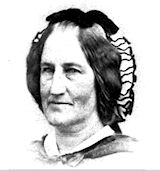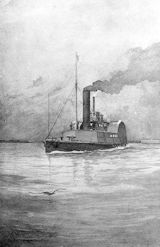May 13.—Martial law went into force in Charleston, S. C, this day. Squads of the Provost-Marshal’s guard were to be seen here and there in the more public portions of the city, and many a luckless wight, in military or semi-military costume, who had no furlough or leave of absence to show, was trotted off to the guard-house, where he either did have, or at some future time will have, an opportunity of giving an account of himself. In more than one instance eminently peaceful individuals, affecting the jaunty and warlike “Beauregard cap,” were hauled up with that true military sternness which is deaf alike to entreaties and remonstances. The quiet precincts of the City Hall were suddenly converted into a veritable camp, to the manifest delight of the urchins who thronged the railings of the enclosure, gazing admiringly upon the taut canvas walls.
There was a great rush at the passport office. Owing to the very limited time allotted for the preparation of passports, only a small portion of those desiring to leave the city were accommodated with the indispensable documents. Some arrangement should immediately be made to remedy this great inconvenience to the public. If the passport system is to be carried out, it is absolutely necessary that the passport office should be open to applicants at all hours —or nearly so. Otherwise, persons passing through the city upon legitimate business will be subject to unreasonable and altogether needless delay.— Charleston Mercury, May 14.
—Gen. Fremont with his command reached Franklin, Western Virginia. He went thither by forced marches, as it was apprehended that an attack would be made on Generals Schenck and Milroy, already in that neighborhood. — The Army of the Potomac made an average advance of twelve miles to-day.—Major-General Halleck at Monterey, Tenn., issued an order expelling newspaper correspondents from his lines.
—General Butler at New-Orleans, issued the following order:—”It appearing that The New Orleans Crescent, a newspaper published in this city, is owned and edited by J. O. Nixon, a rebel, now in arms against the Government of the United States, the Commanding General of this Department orders that the publication of that newspaper be suppressed; and that no publication, by pamphlet, handbill, or otherwise, in any form whatever, shall be made from said office after the promulgation of this order.”
—Brigadier-Gen. Kelly was, with a force of National troops, attacked this afternoon in a pass at Reedy Creek, Va., by guerrillas firing from the mountain-top, but no one was killed or wounded. His men made a gallant charge up the mountain, and returned the guerrillas’ fire with so much spirit, that they fled and made their escape.— Gen. Kelly’s Despatch.
—The rebel armed steamer Planter was run out of the harbor of Charleston, S. C, by a crew of negroes, and surrendered to Commander Parrott, of the United States steamer Augusta. At four o’clock in the morning, Robert Small, pilot of the Planter, got up steam, cast off his moorings, took on board, besides his regular crew, five women and three children, hoisted the rebel and Palmetto flags, steamed down the bay, saluted the forts as he passed them, pulled down the flags when he got past the last fort, hoisted instead a white flag, and steamed boldly out to the blockading vessel.—(Doc. 36.)
—Suffolk, in Virginia, was occupied by Major Dodge with a portion of General Wool’s command.—General Wool’s Despatch.
—Eight hundred and eighty-five prisoners, released from Richmond on parole, left Old Point. Ninety rebel prisoners, who were to be returned to Richmond, positively refused to go, and took the oath of allegiance.—N. Y. Tribune, May 14.
—A Reconnoitring party, under Brigadier General Smith, had a skirmish with the rebel pickets, near Monterey, Tenn., which resulted in killing two, wounding three, and capturing five rebels. The National loss was two.
—At New-Orleans, La., General Butler issued the following order:
It having come to the knowledge of the Commanding General that Friday next is proposed to be observed as a day of fasting and prayer, in obedience to some supposed proclamation of one Jefferson Davis, in the several churches of this city, it is ordered that no such observance be had.
Churches and religious houses are to be kept open, as in times of profound peace, but no religious exercises are to be had upon the supposed authority above mentioned.
—Last evening the rebels commenced shelling Fort Wright, on the Mississippi River, from behind Craighead Point, which, until yesterday, was occupied by the National mortar-boats. They kept up a fire during the night, the shells exploding wide of the mark. They are provided with mortars equal in weight of metal to those used by the Federal fleet.—Chicago Tribune, May 15.
—Dr. Nathan S. Jarvis, surgeon of the regular army, died at Baltimore, Md., this morning.
—Natchez, Miss., surrendered to the Union fleet, under the command of Flag-Officer Farragut—(Doc. 108.)
—The Mobile Evening Telegraph, of this date, contains the following: As is customary, a handcar is sent from Pass Manchac down to Kenner, to ascertain if the road is clear; if so, a signal is given to the conductor of the regular train. In this instance, on Friday evening, the first handcar went down and was questioned by the Federal pickets and allowed to pass. The second car attempted to run past and was fired upon, killing two men and wounding two others. One of the men killed is said to be Mr. Crickard, Assistant Quartermaster at Camp Moore. The third handcar that went down they seized, and took the other two and the hands on board prisoners. Then about twenty-five Federal soldiers came up on the hand-cars and fired on our soldiers stationed to guard the bridge. The Federals set fire to the bridge, and our forces fired two shots at the enemy, when they retreated toward New Orleans. Our forces then went to work and extinguished the fire.
—Genekal Negley, of the army of the Southwest, occupied the town of Rogersville, in Northern Alabama, and drove the rebels across the Tennessee River.—(Doc. 35.)







